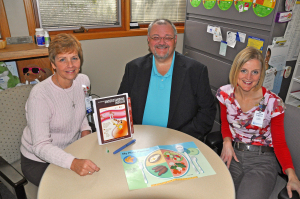
Fuel For Health — Diabetes Education Helps Moberly Man Find Wellness
By Jacob Luecke
This story is featured in the Winter 2013 edition of myBoone Health magazine. Click here for a free subscription.
Mark Morgan is careful about what kind of fuel he puts in his new truck.
It’s a Chevy Silverado. He’s cautious with the engine and wants to protect his investment. He deliberates about different ethanol blends when he’s at the pump; he wants to maximize performance.
However, for many years Mark wasn’t nearly as cautious about the fuel he was putting into his own body.
Fast food, doughnuts and candy helped keep a pulsing sugar buzz going for his marketing consultant job at KRES radio in Moberly.
But the lifestyle took its toll. By his mid-40s, Mark weighed over 400 pounds. He was often getting sick. He started feeling light-headed, like he was going to pass out.
Bad fuel was threatening to kill his engine.
“I was a heart attack or a stroke waiting to happen,” Mark said.
He was diagnosed with diabetes. He began taking medication, but ignored any advice about changing his lifestyle.
“In hindsight, I can see clearly I was in denial,” he said. “It really didn’t mean a lot to me because I didn’t understand what diabetes meant as far as the condition itself, the threat to my health or what I was going to have to do.”
Years went by. His weight peaked at 450 pounds.
Then, about two years ago, he decided to make a change. He began to focus on sustained weight loss. He dropped dozens of pounds.
However, a hemoglobin test showed his diabetes was still out of control. His doctor, Andrea Eden, DO, at Boone Convenient Care in Moberly, compelled him to learn more about his disease. She recommended the diabetes self-management education classes offered at Boone Hospital Center.
Over four weekly sessions, the classes teach essential diabetes facts, possible complications and how to manage the disease through diet, exercise and medication.
“The goal of diabetes self-management education is to empower people with the tools they need to manage their diabetes,” said Jennifer Anderson, diabetes education coordinator.
For Mark, the classes were a revelation. For the first time, he understood what diabetes was, how it was affecting his body and how his food choices could have lasting consequences.
He realized immediate changes were needed. He started watching his carb intake, began to monitor his sugar levels and learned to listen to his body.
He also realized he needed to be on insulin, something he had resisted for years.
“Insulin is not the bad guy — diabetes complications are the bad guys. People may not be making enough insulin to manage their blood sugars. Giving insulin is the only option to increase the amount available,” said Brenda Wilson, RN-BC. “Looking at the long term, you have to decide if your diabetes is going to manage you or if you are going to manage your diabetes.”
Armed with this knowledge, Mark, 54, has a new chance at health. His weight is now down to 346 and dropping. He’s on insulin.
“It’s basically awareness of what I’m putting in my body,” he said. “That’s the key along with medication and exercise.”
He also just feels better. Now he’s rarely sick and he finds it easier to thrive in his creative job.
With good fuel going in his body and the knowledge of how to tame his diabetes, Mark said he’s finally ready to steer his life toward health.
“Before I was completely in a reactive mode; I felt like I was being driven,” he said. “I feel like I’m driving now.”